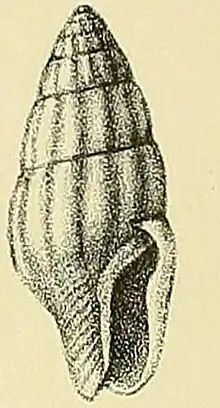Zafra phaula
Zafra phaula is a species of sea snail in the family Columbellidae, the dove snails.[1]
| Zafra phaula | |
|---|---|
 | |
| Shell of Zafra phaula (holotype) | |
| Scientific classification | |
| Domain: | Eukaryota |
| Kingdom: | Animalia |
| Phylum: | Mollusca |
| Class: | Gastropoda |
| Subclass: | Caenogastropoda |
| Order: | Neogastropoda |
| Superfamily: | Buccinoidea |
| Family: | Columbellidae |
| Genus: | Zafra |
| Species: | Z. phaula |
| Binomial name | |
| Zafra phaula (Melvill & Standen, 1901) | |
| Synonyms | |
|
Columbella (Seminella) phaula Melvill & Standen, 1901 superseded combination | |
Description
The length of the shell attains 2 mm, its diameter 1 mm.
This minute, ovate-obese shell is semipellucid. The shell contains five whorls of which two in the protoconch. It is doubtless nearly allied to Zafra melitoma and others of this group. It is much the smallest of the Karachi species, and the ribs are thicker in proportion to the size of the shell. There is no trace of spiral liration, nor has the outer lip any denticles on the inner surface. The aperture is narrow. The columella is simple. The form is also more attenuate and exiguous. [2]
Distribution
This marine species occurs off Karachi at the Pakistan coast.
References
- MolluscaBase eds. (2023). MolluscaBase. Zafra phaula (Melvill & Standen, 1901). Accessed through: World Register of Marine Species at: https://www.marinespecies.org/aphia.php?p=taxdetails&id=511628 on 2023-10-11
- Melvill, J. C. & Standen, R. (1901). The Mollusca of the Persian Gulf, Gulf of Oman and Arabian Seas as evidenced mainly through the collections of Mr. F. W. Townsend, 1893-1900, with descriptions of new species. Part 1, Cephalopoda, Gastropoda, Scaphopoda. Proceedings of the Zoological Society of London. 1901 (2): 327-460
- Perugia, I. (2021). Some new microshells from Oman (Masirah Is.). Xenophora Taxonomy. 32: 48–56.
- Boyer, F., Pelorce, J. & Gori, S. (2022). Révision des Columbellidae de l'île de Masirah, Oman. Partie 1 : genres Smithena gen. nov., Anachis H. Adams & A. Adams, 1853, Zafra A. Adams, 1860 et Parvanachis Radwin, 1968. Novapex. 23(3): 87–110.